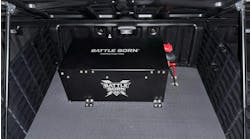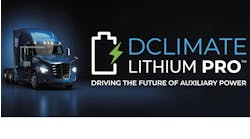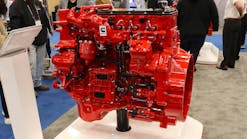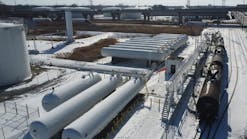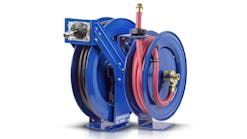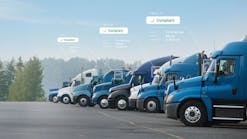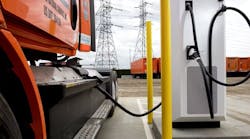Electrifying the entire U.S. commercial trucking fleet could cost nearly $1 trillion, according to a new industry-funded study. That merely includes the cost of building out charging infrastructure—not replacing diesel-powered equipment with the more expensive battery-electric, heavy-duty trucks, which aren’t yet able to handle long-haul freight.
Industry leaders warned during a media briefing detailing the study that those lofty costs and complicated electrifications will be passed on to U.S. fleets, their customers, and consumers.
“We thought about how you can possibly calculate the end cost to the consumer, but that’s just impossible to do,” said Jim Mullen, executive director of the Clean Freight Coalition, which commissioned the Roland Berger study. “But I think we all know the cost of the tab is eventually going to be picked up in part by the consumer.”
However, the study details the upfront costs to the commercial trucking and transportation industries: $620 billion to build charging infrastructure to electrify all medium- and heavy-duty vehicles. Wilfried Aulbur, a senior partner with Roland Berger, said that cost includes on-site chargers, power infrastructure, and utility service costs.
“That’s a huge amount of money,” Aulbur said during the March 19 media briefing on the study. “And that compares to about $800 billion in revenue that the logistics industry typically generates at a 5% return on sales. I think these numbers, by themselves, already indicate the size and the challenge that we have to fund this transition.”
Due to economic and operational constraints, heavy-duty vehicles face more challenges than medium-duty vehicles in electrification. The study forecasts that average charging infrastructure will cost fleets $145,000 per heavy-duty vehicle and $54,000 per medium-duty truck.
Adding to these costs, the study found that utility companies would need to invest another $370 billion in electric grid upgrades and new builds. That price tag is close to the amount the utility industry has spent on grid distribution over the past 15 years.
The study did not address other near-zero and zero-emission alternative fuels, such as green hydrogen and biofuels. But Aulbur said a takeaway from his research is that the industry should “continue to be technology agnostic—whether it’s biofuel, whether it’s biodiesel, whether it’s hydrogen ICE—so that we do not become dogmatic in the choice of technology and solutions as we drive to decarbonize the transport industry.”
Consumers will feel this supply chain ‘unfunded mandate’
“This study illustrates a $1 trillion unfunded mandate on the supply chain, including our industry,” Chris Spear, chief executive of the American Trucking Associations, said during the briefing. “So that reflects in the price consumers pay, which is going to be tremendously inflated.”
He said the regulatory push to electrify trucking over the next six to 10 years would result in fewer trucks moving freight. “It’s going to come very quick,” he said of consumers feeling the decarbonization pinch. “For an administration that’s concerned about inflation, concerned about the supply chain, they need to take a holistic approach to this. Be transparent. We’re not saying ‘no’ to zero emissions. We just need a path to get there. This is not it.”
Read more at FleetOwner.com, a Bulk Transporter affiliate.
